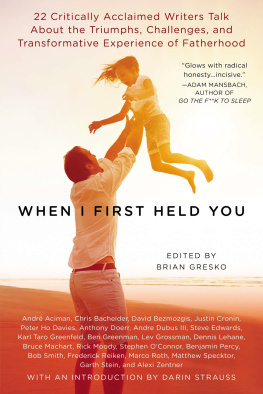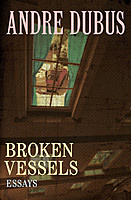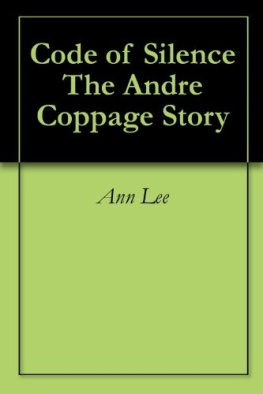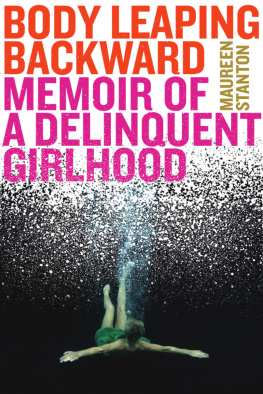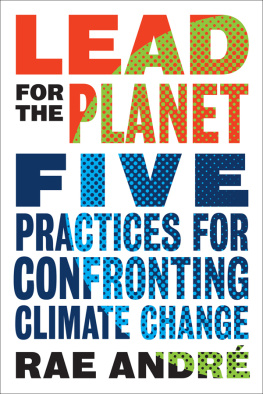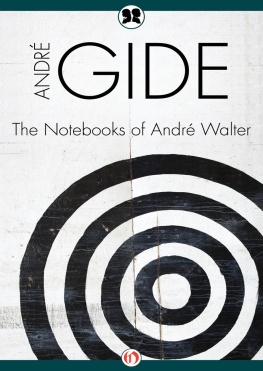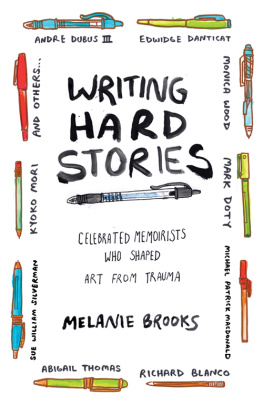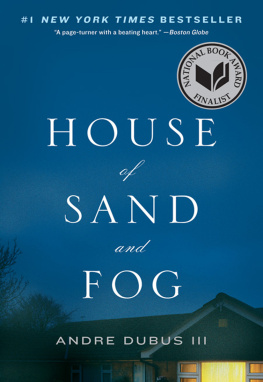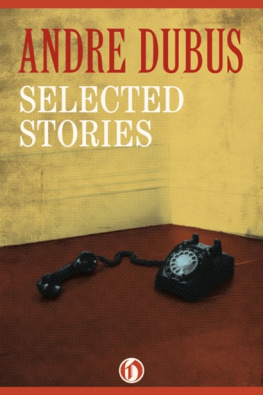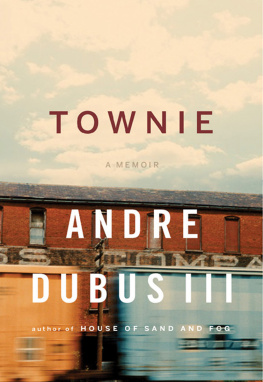Dubus Andre - Conversations with Andre Dubus
Here you can read online Dubus Andre - Conversations with Andre Dubus full text of the book (entire story) in english for free. Download pdf and epub, get meaning, cover and reviews about this ebook. year: 2013, publisher: University Press of Mississippi, genre: Detective and thriller. Description of the work, (preface) as well as reviews are available. Best literature library LitArk.com created for fans of good reading and offers a wide selection of genres:
Romance novel
Science fiction
Adventure
Detective
Science
History
Home and family
Prose
Art
Politics
Computer
Non-fiction
Religion
Business
Children
Humor
Choose a favorite category and find really read worthwhile books. Enjoy immersion in the world of imagination, feel the emotions of the characters or learn something new for yourself, make an fascinating discovery.

- Book:Conversations with Andre Dubus
- Author:
- Publisher:University Press of Mississippi
- Genre:
- Year:2013
- Rating:3 / 5
- Favourites:Add to favourites
- Your mark:
- 60
- 1
- 2
- 3
- 4
- 5
Conversations with Andre Dubus: summary, description and annotation
We offer to read an annotation, description, summary or preface (depends on what the author of the book "Conversations with Andre Dubus" wrote himself). If you haven't found the necessary information about the book — write in the comments, we will try to find it.
Conversations with Andre Dubus — read online for free the complete book (whole text) full work
Below is the text of the book, divided by pages. System saving the place of the last page read, allows you to conveniently read the book "Conversations with Andre Dubus" online for free, without having to search again every time where you left off. Put a bookmark, and you can go to the page where you finished reading at any time.
Font size:
Interval:
Bookmark:
Literary Conversations Series
Peggy Whitman Prenshaw
General Editor
Edited by Olivia Carr Edenfield

www.upress.state.ms.us
The University Press of Mississippi is a member of the Association of American University Presses.
Copyright 2013 by University Press of Mississippi
All rights reserved
Manufactured in the United States of America
First printing 2013

Library of Congress Cataloging-in-Publication Data
Dubus, Andre, 1959
Conversations with Andre Dubus / edited by Olivia Carr Edenfield.
pages cm. (Literary Conversations Series)
Includes index.
ISBN 978-1-61703-785-6 (cloth : alk. paper) ISBN 978-1-61703-786-3 (ebook) 1. Dubus,
Andre, 1959- 2. Authors, American20th centuryInterviews. 3. FictionAuthorship. I. Edenfield, Olivia Carr, editor of compilation. II. Title.
PS3554.U2652Z46 2013
813.54dc23
[B]
2013003147
British Library Cataloging-in-Publication Data available
Works by Andre Dubus
Collections of Short Fiction and Novellas
Separate Flights. Boston: David R. Godine, 1975.
Adultery and Other Choices. Boston: David R. Godine, 1977.
Finding a Girl in America: A Novella and Seven Short Stories. Boston:
David R. Godine, 1980. The Times Are Never So Bad: A Novella and Eight Short Stories. Boston:
David R. Godine, 1983. We Dont Live Here Anymore: The Novellas of Andre Dubus. New York:
Crown Publishers, 1984. The Last Worthless Evening: Four Novellas and Two Stories. Boston: David
R. Godine, 1986. Selected Stories. Boston: David R. Godine, 1988. Dancing After Hours. New York: Alfred A. Knopf, 1996. In the Bedroom. New York: Vintage Contemporaries, 2002.
Novella
Land Where My Fathers Died. Winston-Salem: Palaemon Press, 1985 (limited edition).
Novels
The Lieutenant. New York: Dial Press, 1967.
Voices from the Moon. Boston: David R. Godine, 1984.
Collections of Essays
Broken Vessels. Boston: David R. Godine, 1992.
Meditations from a Movable Chair. New York: Alfred A. Knopf, 1998.
Edited Work
Into the Silence. Cambridge: Green Street Press, 1988.
Corinne Peace / 1970
Christopher Caldwell and Adam Cherson / 1982
Dev Hathaway / 1983
Kay Bonetti / 1984
Mimi Read / 1984
Robert Dahlin / 1984
Jesse Kornbluth / 1985
Amy Schildhouse / 1986
Patrick Samway, S.J. / 1986
Stacey A. Chase / 1986
Stacey A. Chase / 1989
Regina Hackett / 1990
Tim McCarthy / 1990
Susan Larson / 1991
Eleanor Wachtel / 1991
Olivia Carr Edenfield / 1993
Lori Ambacher / 1993
John Smolens / 1994
Tom Grimes / 1997
Jennifer Levasseur and Kevin Rabalais / 1998
Greg Garrett / 1999
Andre Dubus was a generous man. He enjoyed people and good conversation. He was warm, gregarious, engaging, and smart. He liked to tell stories and to talk about the art of telling stories. He liked to write and to talk about the art of writing. For these reasons and because peoplestudents, journalists, other short-fiction writersfound him approachable, he gave forty-two interviews (thirty-six print and six audio) over the course of his writing career, half of which are collected here. Andre was easy to be with, perhaps because he showed an interest in the person before him. He was curious about where folks came from, how they saw things, what their angle was. And he was happy to tell you his opinion on his various characters or his politics or his taste in music. He was happy to share, happy to help along the various and many people who came to visit and to write down what he had to say about the American short story and his place in that great genre. Andre Dubus was a generous man.
Generosity of spirit, a willingness to help, is what led him to stop along I-93 in Wilmington, Massachusetts, just after midnight on July 23, 1986, to aid Luz Santiago and her brother, Luis, who were stranded after running over an abandoned motorcycle. While assisting the two across the highway, he and Luis were struck by a car driven by Nancy Anthony, a young woman from Woburn, who he was eventually able to forgive through prayer, as he would later tell Stacey Chase (Interview). In early January of 1997, Dubus spoke frankly of this night in an interview with Chase, reporter for the Lowell Sun. As he recalled the events, he explained that he had no memory of the impact and he expected that he never would. Luis had died instantly while Dubus would go on to suffer great pain and a long rehabilitation as he learned to navigate without the use of his legs. The impact of the car going fifty-eight miles per hour crushed his right leg and necessitated the removal of his left leg above the knee. He would never be able to support his weight and so could not master the prosthetic he hoped for.
When Chase met with him only five months after the accident, however, his inability to walk was not what was worrying him. What had him in a state of despair that led to tears was his struggle to write. He shared with Chase that there was no energy and that he could not get into it. As he explained, They say I am just concentrating on getting well and have no energy left to write. I dont know why I cant write. The fact that he could not was a heavyweight, and when the tears came, he admitted, I get the blues a lot. I am crying because I cant walk and I cant work (Accident). When the two would meet again two years later, Dubus was still suffering, only this pain was from a separate tragedy, related, of course, but new. His wife Peggy Rambach had left and taken their two young daughters, Madeline and Cadence, with her. Dubus was learning to live alone in the wake of learning to live with daily pain and a frustrating disability that robbed him of his physical energy and temporarily stole his ability to write the fiction that he and his readers depended upon. If it werent for prayer, Id be fucked, Dubus would tell Chase. When you grow up with the Passion of Christ as an example, I mean, you know at least theres a membership of suffering. And you get the focus that youre not the only one in the world whos got things rough (Interview) Stacey would write that while Dubus was clearly grieving over this loss of his family, the man she spoke with that day compared to the man she had met two years prior was a very different person, as this time, the thick-chested, salty-tongued Southerner and his hard luck looked to be an even match. Dubus had recently received the $5,000 Jean Stein Award and a $310,000 MacArthur Foundation Fellowship, news which, he admitted, left him with insomnia and loose bowels for about three days but feeling incredibly blessed (Interview). These blessings continued to come with the publication of essays and stories as Dubus found his writing voice again.
It is impossible to pick up a recent article regarding Dubuss fiction and not find a lengthy reference to the accident. Scholars and interviewers both remark on the significance that night had on Andres life. However, prior to that January 1986 evening, Dubus had already published eight booksfour collections of short stories, two novels, a collection of novellas, and a novella published separately. While formidable, the experience would come in the latter half of his career. By the time he was injured, Dubus was already recognized as one of the masters of the genre and was generally compared to other contemporary giants in the field such as Raymond Carver. Vivian Gornick linked Dubus to Carver and Richard Ford, tracing each back to Ernest Hemingway: Just behind the leanness and coolness of the prose lies the openbut doomedexpectation that romantic love saves. Settings vary and regional idioms intrude, but almost always it is men and women together that is being written about (1). Gornick concludes that Dubus is the the most complex and least well known, but the most articulate in the matter of men and women together (32). Likewise, other critics and reviewers found connections to Hemingway, in both style and spirit, in the emphasis on ritual and redemption, in the importance of the sacrament and the everlasting peace that comes from grace. Andre, too, would acknowledge his debt to Hemingway in many of the interviews that he gave over the years. He discussed Hemingways objectivity and clarity of voice, his descriptive language. And he remarked as well on the importance of ritual in writing, another similarity to Hemingway.
Font size:
Interval:
Bookmark:
Similar books «Conversations with Andre Dubus»
Look at similar books to Conversations with Andre Dubus. We have selected literature similar in name and meaning in the hope of providing readers with more options to find new, interesting, not yet read works.
Discussion, reviews of the book Conversations with Andre Dubus and just readers' own opinions. Leave your comments, write what you think about the work, its meaning or the main characters. Specify what exactly you liked and what you didn't like, and why you think so.

